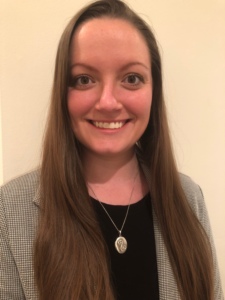News
Fellow Q&A: Julia Klingler, WWTF ’19
“I had a lot to learn about adapting and creating equity”
 WW Teaching Fellows come from many different backgrounds but are united by a single goal: to teach science, technology, engineering, and math (the STEM fields) in some of the nation’s highest-need schools. But what makes these Fellows tick? What inspired them to pursue a career in the classroom? In this WW Perspectives series, we hear from WW Teaching Fellows about what drew them to the program.
WW Teaching Fellows come from many different backgrounds but are united by a single goal: to teach science, technology, engineering, and math (the STEM fields) in some of the nation’s highest-need schools. But what makes these Fellows tick? What inspired them to pursue a career in the classroom? In this WW Perspectives series, we hear from WW Teaching Fellows about what drew them to the program.
Julia Klingler, a 2019 WW Pennsylvania Teaching Fellow, currently teaches seventh grade physical science and eighth grade life science at Benjamin Franklin Elementary School in the School District of Philadelphia. In WW’s conversation with Ms. Klingler, she talks about thriving as a teacher in the School District of Philadelphia, teaching in a high-need school, the successes and challenges of distance learning, and more.
WW Teaching Fellowship: Why did you choose a career in teaching?
Julia Klingler: I chose a career in teaching because I have always been passionate about science, but I did not want to be in a lab as my career. It felt too stationary and I couldn’t decide what kind of scientist I wanted to be. Teaching lets me move around, be social, and develop relationships with so many different types of people. It is a career that is always interesting and each day is always different.
WW Teaching Fellowship: What have you learned so far from the Fellowship experience—be it about yourself, about teaching, about students, or in general?
Julia Klingler: I learned that I had a lot to learn about creating equity in Philadelphia city schools, as well as how to improvise science activities in an environment where we barely have any materials. I learned how to adapt to situations quickly, and I gained more confidence in myself and feel good standing at the front of the classroom.
WW Teaching Fellowship: How do you thrive despite the daily challenges of teaching?
Julia Klingler: Focus on the kids. It is hard to develop relationships with students who are so different from you (I haven’t experienced a lot of what they have), but if you are honest with yourself and honest with them, relationships do form! I want my students to be comfortable in my class and be excited about the material so I try to make each lesson as interesting as possible.
WW Teaching Fellowship: What has been the biggest challenge of distance learning as a teacher at the School District of Philadelphia?
Julia Klingler: It feels like the workday is longer and you are always connected to students and their parents. You have to be able to find a good work/home balance, even though you’re always at home. It is also difficult to have truly collaborative activities for the students.
WW Teaching Fellowship: What has been the biggest success of distance learning as a teacher at the School District of Philadelphia?
Julia Klingler: There are so many different online platforms that can be used to make activities engaging!
WW Teaching Fellowship: For the new cohort who will be entering the School District of Philadelphia as novice teachers, what advice do you have regarding becoming an active participant in your school as a new teacher?
Julia Klingler: If your mentor teacher is involved in other things with the school, ask to be part of those as well. Take the initiative to be involved, whether you’re just walking the room and talking to kids or introducing the lesson. Soon, you’ll have to do it all for one class, so doing as much as you can up front will prepare you well.
WW Teaching Fellowship: What is the most important lesson about teaching that you have learned from your mentor in your clinical placement?
Julia Klingler: You need to be able to adapt your lesson or explanations for students who don’t understand things the way you do. Also, there will be times when you spend a lot of time “perfecting” a lesson that you’re really proud of. Then when you go to do it in your class, it turns into a complete failure. My advice is to not take it to heart, think about how you can fix it, and then try again the next day! If you teach something wrong, just admit it and try again.
WW Teaching Fellowship: Why was it important for you to teach in a high-need school? What makes it rewarding?
Julia Klingler: The students. When you see them grasp a concept, that “aha” moment is so rewarding. Students in schools with low funding need good science teachers because you have to do science in order to learn it. Creativity is needed to use the materials you have.
WW Teaching Fellowship: Can you recall any moments in the classroom or school when you knew that you’re making a difference as a teacher?
WW Teaching Fellowship: A student once randomly told me, “Ms. K., you’re a great science teacher!” I was surprised and asked if he was being sarcastic. Then, another student said, “He’s not lying, you keep things fun!” I wouldn’t be where I am in teaching if I didn’t have my student teaching experience.

